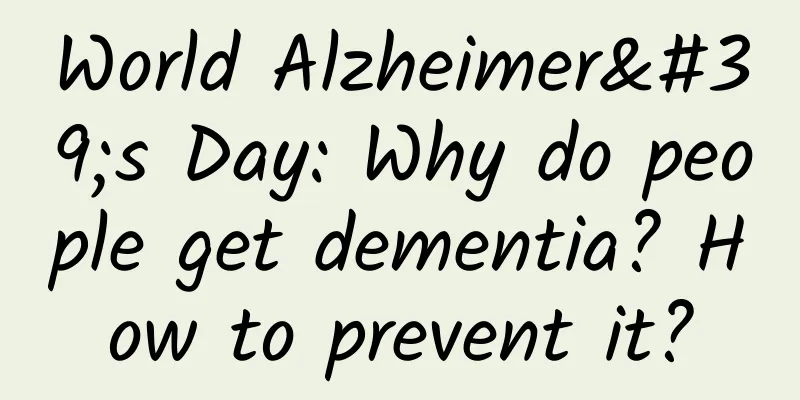World Alzheimer's Day: Why do people get dementia? How to prevent it?

|
With the development of society and the improvement of medical and health care levels, people's average life expectancy continues to increase, and the incidence of many age-related diseases is increasing year by year. These diseases seriously affect the quality of life of the patients themselves, and also bring huge economic and care burdens to their families and society. Today we will briefly talk about one of these diseases - dementia. To talk about dementia, we must first talk about what cognition is. Cognition is the process by which the human brain receives external information, processes it, and converts it into internal psychological activities, thereby acquiring or applying knowledge, including memory, language, calculation, orientation, understanding, judgment, execution, visual space and other aspects. If one or more of the cognitive functions are damaged, it is called cognitive impairment. If cognitive impairment leads to a significant decline in the patient's daily life, social interaction or work ability, dementia can be diagnosed. The diagnosis of dementia is divided into three aspects: confirming whether it is dementia, determining the degree of dementia and clarifying the cause of dementia. The doctor will make a judgment based on the patient's medical history, clinical manifestations, cognitive examinations, necessary imaging examinations and laboratory tests, all of which need to be performed in professional medical institutions. Therefore, when we find that our relatives and friends have cognitive changes, it is best to take them to the memory clinic or neurology department in time to achieve the purpose of early diagnosis and early intervention. Why do people get dementia? The cause of dementia is still unclear, but experts have discovered many risk factors that may lead to dementia through various studies. Since there is currently no drug that can change the course of dementia, early intervention and prevention of these risk factors is a feasible way to reduce or delay the onset of dementia. The risk factors for dementia can be divided into two categories: modifiable and non-modifiable. Non-modifiable risk factors include: age, gender, genetic factors, and family history. Modifiable risk factors include: cardiovascular and cerebrovascular diseases, blood pressure, blood lipids, type 2 diabetes, smoking and drinking, diet, education level, physical and mental activities, brain trauma, and others. In this article, we will focus on how to prevent or delay dementia through four factors: diet, education level, physical activity, and mental activity. There is a diet called the Mediterranean diet, which recommends eating fish, fruits and vegetables, olive oil, moderate red wine and less red meat. It has been confirmed by multiple studies to reduce the risk of dementia. In addition, a high level of education reduces the risk of AD. Even if you carry the susceptibility gene for AD, this protective effect persists, so its role is really not to be underestimated. Regular physical activity in middle age can reduce the risk of dementia, especially those moderate-intensity sports that require moderate effort and can significantly increase the heart rate. Doctors recommend that you choose the right exercise for you according to your own situation and do it 3-5 times a week. Finally, by participating in various activities that increase mental activity, such as playing cards, reading, and learning new knowledge, the risk of dementia can be reduced. This mental activity can also be integrated into many other daily activities, including social activities, knitting, gardening, playing musical instruments, etc. Traditional Chinese exercises, such as Ba Duan Jin and Tai Chi, can also protect cognition. Conversely, a decrease in social activities will increase the risk of dementia, especially for elderly people living alone. A decrease in social activities will greatly increase the risk of dementia. References: [1] Tian Jinzhou. Chinese Dementia Diagnosis and Treatment Guidelines[M]. 2017 edition. Beijing: People's Medical Publishing House, 2018. [2] Jia Jianping. Chinese Guidelines for the Diagnosis and Treatment of Dementia and Cognitive Impairment[M]. 2015 edition. Beijing: People's Medical Publishing House, 2016. |
>>: Why can't celery leaves be eaten (contains bitter ingredients, low water content and tastes bad)
Recommend
What kind of person doesn't feel pain when having a child?
Giving birth is very painful for first-time mothe...
What does it feel like when your hymen breaks? Does it hurt?
There are actually some symptoms after the ruptur...
Amniotic fluid infusion has effect after a few days
Every pregnant woman needs to be aware of the hug...
High ALT in mid-pregnancy
Women must take good care of their bodies during ...
How big is the gestational sac at 45 days of pregnancy?
In fact, the formation of human beings is a relat...
Is the stent implant a permanent solution? Here are some facts about heart stent implants
Many people have misunderstandings about heart st...
Is it normal to have a 40 day long menstrual cycle?
How many days is a normal menstrual cycle? Many w...
What causes female frigidity?
The causes of sexual indifference can be divided ...
What is the cause of maternal skin itching?
Postpartum skin itching is often a disease that b...
What if the menstrual period is brown at the end?
Whether a woman's menstruation is normal is a...
The relationship between acne and diet
The issue of acne and diet...
Disadvantages of taking folic acid after 12 weeks of pregnancy
In response to this problem, relevant personnel s...
“Health from eating” series | National Nutrition Week: Sterilized eggs are not sterile, do you still dare to eat them “raw”?
As the main consumer groups in society change, yo...
Complete picture of girls' appendicitis
Appendicitis is a common gastrointestinal disease...
How to regulate your menstrual cycle
When a woman's body develops to a certain ext...









